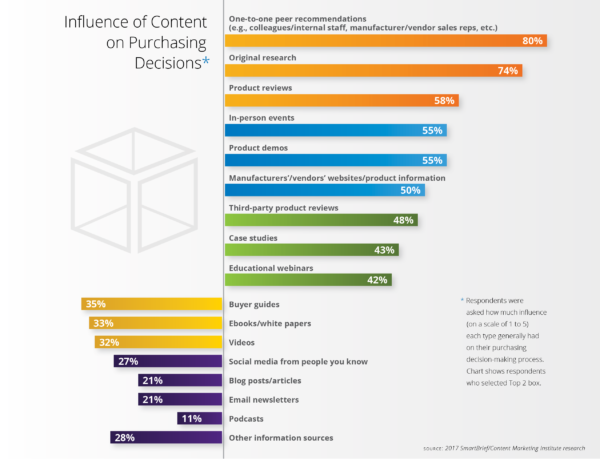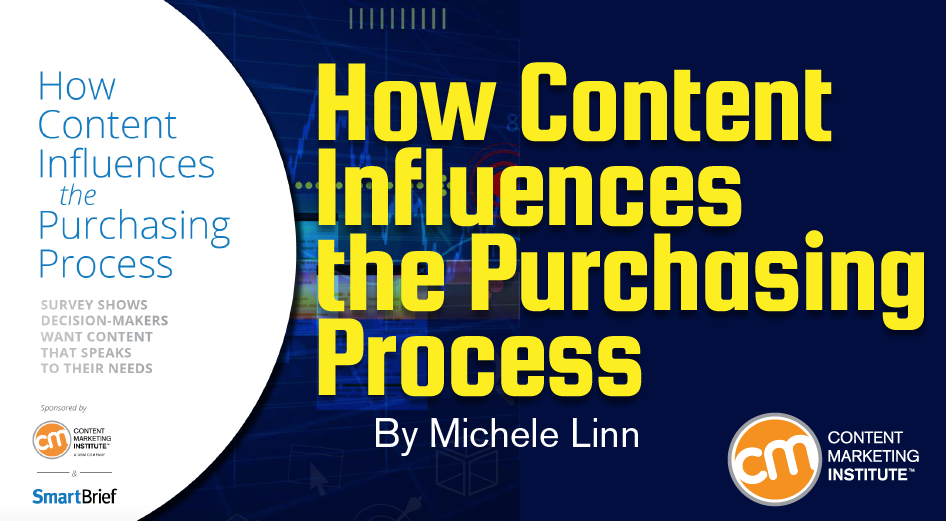 Each year at CMI, we survey marketers about how they use content marketing and how they find success internally. The insights are useful, but what we also want to know is what’s going on in the minds of the people who consume the content?
Each year at CMI, we survey marketers about how they use content marketing and how they find success internally. The insights are useful, but what we also want to know is what’s going on in the minds of the people who consume the content?
So, we were happy to join forces with SmartBrief when approached about doing a joint research project on how content influences the purchasing process. The survey represents the views of 1,200 SmartBrief subscribers who are involved in the purchasing process. The research focuses on what type of content is most influential, how these decision-makers perceive content coming from a vendor, and more.
You can download the report or read on for a few ideas on what content marketers like yourself need to know.
Decision-makers rely on you for info
Perhaps not surprisingly, 81% of respondents conduct research before they bring you, the vendor, in to discuss a project.

But you may be surprised by how much decision-makers want to hear from you. The majority say they have no preference on where they get their information – including 40 percent who say the source of the content doesn’t matter, as long as the information is credible. And 24% prefer information to come from the vendor they’re considering.

YOUR ACTION: The data confirms something most of us know (although it’s good to share with any naysayers): Decision-makers want to hear from you.
You have a substantial opportunity to provide insights and answer questions – and doing so helps information-seekers find you.
While much has been written on how to answer your customer’s questions – and get found on search – I like this common-sense (yet often overlooked) approach from Andy Crestodina. He walks through how to better understand a user’s intent when searching – and how to create something that your brand will actually rank for.
How to Create Content People Actually Search For
Original research is considered highly influential
If you were to guess which source of information had the most influence on a purchasing decision-maker, you may hazard a guess that peer recommendations come in at the top – and you’d be right. But, right after word of mouth is original research.

Original research ranks as far more influential than many other types of content, including product-focused tactics such as product reviews, demos, third-party reviews, etc.
YOUR ACTION: I’m a huge fan of original research as I have seen tremendous results from the marketing side – and I was glad to see decision-makers look so favorably on this as well.
While tackling original research isn’t necessarily easy, it’s worth the effort – and it’s something I consistently suggest to people looking to build their audience. In a recent post about the challenges and opportunities facing professional services marketers, content marketing manager Christina Galoozis from consulting firm West Monroe Partners commented that these marketers consider research-based content the most effective content they produce.
Christina explains, “It’s because we have something original to say that the reader can’t get anywhere else. We are investing in more proprietary surveys this year than ever before.”
#Research gives us something original to say to readers, says @Galoozis. Click To TweetResearch has played such a critical role in CMI’s growth that we have a full-time research director, Lisa Murton Beets (who is sharing her secrets during Content Marketing World). Our PR consultant, Amanda Subler, offers step-by-step instructions as she spreads the word about our research, which gets written about or quoted at least once (usually more) per day every single day.
Decision-makers are sharing via email instead of social
It’s not news that social shares should not be your primary metric (Steve Rayson covers this really well), and the research gives us another way to look at this.
We asked decision-makers how they share information about purchasing decisions with their teams, and a whopping 82% say they send information via email. As you can see in the chart below, only a tiny percentage share information with their teams via social media.

This finding mirrors that of a study from RadiumOne which contends that 84% of the sharing that takes place is via dark social. If you are not familiar with the term “dark social,” it is everything that is shared from one person to another (think: email, instant message, etc.) This type of sharing is very difficult to track, but it’s useful to understand that when you track social shares you are likely only seeing a small piece of the puzzle. This post from Hootsuite offers a great primer on dark social if you want to learn more.
YOUR ACTION: First, if you are getting pressure to show social shares, share this research. If you are trying to reach the decision-maker, the number of shares for your content is likely not a good measure of your content’s effectiveness.
Beyond that, think about how you can make your content more shareable via email – or how you can craft something that can be shared during calls or as standalone documents. Toby Lee, chief marketing officer, legal business unit, at Thomson Reuters, also offers a good suggestion. Let’s say someone attends a webinar. Instead of communicating only with that individual, spark a conversation between that attendee and his or her manager who likely is the person involved in a purchasing decision.
Think about how you can make your #content more shareable via email, says @MicheleLinn. Click To Tweet8 Things Any Good Marketer Should Know About Email
Conclusion
Your audience really does want to hear from you, and you can make simple changes to your approach to ensure that you are giving decision-makers what they want.
Editor’s note: A special thanks to Lisa Murton Beets, CMI research director, and Nancy Reese, CMI research consultant, who created this research and helped with this post.
Download the full report on how content influences the purchasing process from SmartBrief and CMI.
Learn more about how to use research in your own content marketing at Content Marketing World, Sept. 5-8. Register today. Use code BLOG100 to save $100.

